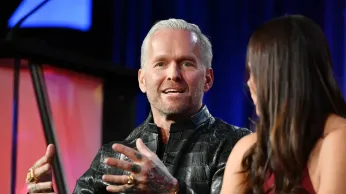
4 hours ago
Bob Harper Defends 'Biggest Loser': “It’s Stupid” to Blame Show for Anti-Fat Culture, Says Trainer
READ TIME: 3 MIN.
The conversation around The Biggest Loser, one of American television’s most controversial reality shows, has been reignited following the release of the documentary Fit for TV: The Reality of The Biggest Loser. The film features candid interviews with former contestants who recount both the positive and negative aspects of their time on the show, including allegations of unhealthy weight loss practices and emotional distress stemming from the program’s approach to transformation and competition .
Bob Harper, who served as the show’s longest-standing trainer, is now speaking out in response to the renewed criticism. In a recent interview, Harper firmly dismissed the idea that The Biggest Loser should be blamed for fostering or amplifying anti-fat culture, stating, “I really do believe we helped a lot of people. The trolls that are out there just want to attack in any way they can” . Harper’s comments come as former contestants in the documentary, such as Joelle Gwynn, share raw reflections about their experiences, including moments of intense confrontation on set.
Since its debut in 2004, The Biggest Loser has been both a ratings success and a focal point for controversy. Critics have long accused the show of promoting unrealistic body standards and perpetuating fat-shaming—an accusation that is particularly resonant in LGBTQ+ and body positivity communities, where issues of body image and acceptance are deeply intertwined with identity and self-esteem .
Harper, now approaching 60 and teaching yoga in New York City, insists that the intentions behind the show were constructive, not harmful. He emphasizes that while he cannot speak on behalf of the network or producers, his personal motivation was to help participants lead healthier lives. “I’ve learned to not take things personally,” Harper said, reflecting on years of public scrutiny. Despite the backlash, he maintains that many contestants benefited from their time on the show, and that its legacy should not be reduced to accusations of shaming .
Within LGBTQ+ communities, the debate over The Biggest Loser’s impact carries unique significance. Research has shown that LGBTQ+ people, especially transgender individuals and gay men, are disproportionately affected by body image pressures and eating disorders compared to the general population . Reality television’s portrayal of weight loss journeys can either reinforce harmful stereotypes or provide a platform for nuanced conversations about health, inclusion, and self-worth.
While Harper has not specifically addressed LGBTQ+ viewers in his recent statements, the discussion about The Biggest Loser’s cultural influence resonates with ongoing efforts in queer communities to challenge toxic body standards and advocate for body diversity. Many LGBTQ+ advocates argue that mainstream media must move beyond narratives that equate thinness with virtue or success, and instead prioritize messages of holistic wellness, acceptance, and joy in diverse bodies .
The controversy surrounding The Biggest Loser is part of a broader reckoning within the entertainment industry about reality television’s ethics and impact. Documentaries like Fit for TV provide important space for former participants—many of whom have gone on to become advocates for mental health and body positivity—to share their stories and call for more responsible storytelling .
For Harper, who describes himself as “mostly unbothered by the online backlash,” the conversation is ultimately about intent and outcome. “People just want to attack in any way they can,” he said, underscoring his belief that the show was never about shaming but about transformation and hope .
As the debate continues, LGBTQ+ advocates, wellness professionals, and entertainment producers alike are being called upon to ensure that future programming centers inclusive, affirming, and trauma-informed approaches to health and wellness—both on and off screen.






